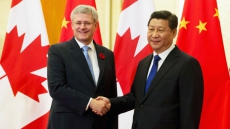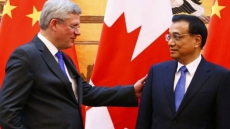OTTAWA — Inside his humming facility on the outskirts of Ottawa, Mark Perry's operation pumps out specialized plastic products — everything from patented storm-drain basins to giant toy guns for water parks.
For this Ontario manufacturer, business is growing. Soon it might even be looking to hire.
Perry can count himself among the survivors of Central Canada's manufacturing downturn, a tough era largely brought on by fierce competition from China and a high dollar that claimed the lives of many companies across the region.
The period devastated the once-mighty Ontario manufacturing sector, enabling the Prairie energy fields to take over as Canada's economic power plant.
But with the rapid fall of oil prices, the tumbling loonie and renewed U.S. demand, there are expectations the country's economic strength could once again shift back to Central Canada if conditions persist.
The potential reversal, however, begs a question: Can the hobbled region pick up the slack from Western Canada?
Experts believe leaner, more-specialized companies like Perry's Plas-Tech Fabrications will play a big part in any Central Canada revival.
But Perry says the changing conditions have actually created fresh challenges for his 18-year-old outfit, which employs eight people and sells finished goods domestically and as far away as China.
Despite his recent success, the company has yet to see the benefits of lower crude translate into cheaper prices for freight and the petroleum-filled plastic it uses in its products.
On top of that, as a net importer of raw materials from the U.S., the lower dollar has actually hurt its bottom line.
"It's kind of a mixed bag, really," said Perry, who compared the delay to gas station pump prices that are slow to follow changes in world crude prices.
"The way I look at it is, if there's any benefits, they have yet to trickle down. It's almost like everyone's holding on to that gain — and milking it as long as they can."
He credits the growth of his company, which saw sales increase by 25 per cent compared to a year ago, to constantly staying on top of things like structural costs.
It was that kind of diligence that helped Plas-Tech endure the difficult times, he said.
Looking at the big picture, experts believe Ontario stands to benefit from Western Canada's losses, but it remains to be seen how soon a full-blown resurgence could arrive.
The head of Canada's biggest industry and trade association said Ontario manufacturers, as a whole, have already seen improvements in production and sales.
Jayson Myers, the president and chief executive of Canadian Manufacturers and Exporters, said in some cases auto-parts companies have had trouble keeping up with the growth.
"There's no reason in the world why Ontario manufacturing sales cannot exceed where we were back before the recession," Myers said.
However, he believes Ontario's industrial landscape will be different than before.
Many of the huge, mass-producing facilities of yesteryear will be replaced with operations that produce higher-value goods, like customized bar fridges and furniture, he said.
"It's not going to be business as usual and it is going to require companies to focus more on very specialized products and to do things that nobody else can do," said Myers.
"The money today is made in design, engineering, innovation and customer service, not necessarily made in the manufacturing itself."
North America's manufacturing industry was decimated in the 2000s by China's emergence as a low-cost alternative.
The Canadian manufacturing sector was hit hard by an extended period of a high loonie and then by the 2008-09 financial and economic crisis, which slowed demand from the U.S. and other parts of the world.
The Ontario economy is now waiting to see if the more-inviting economic environment will attract investment.
Export Development Canada's chief economist believes it's more a question of when.
"Demand is firing up now, businesses are becoming more convinced that this is the real thing," Peter Hall said of cautious businesses looking to invest.
Hall expects it will take about a year before Ontario starts to see significant new investments, but he's convinced they will come if the current conditions last.
He said Ontario is attractive because it already boasts a clustered, highly developed manufacturing sector close to the U.S. market.
"Folks will be looking here; however we haven't seen huge evidence of that yet," Hall said.
"We're still dealing with the fallout of a long period of... investment hibernation."
Even with the encouraging signs, Ontario's economy still faces many obstacles.
Myers said many of the skilled workers either left the province or retired during the long downturn. The education system, he added, is no longer training enough young people in the necessary practical skills and has struggled to keep up with newer technologies.
He also noted how Alberta oilsands projects, which are expected to suffer from the low oil prices, buy a lot of products, like valves, steel, pumps and technology, from Ontario.
On top of that, Ontario still has relatively high electricity prices, he said.
Perry points to hurdles like these when he thinks about Ontario's future.
He's skeptical whether the region can wrestle the national title of economic heartland back from Western Canada.
"I don't see the power shift necessarily coming back to Ontario — it will be more of an evening of the two powers, if you ask me," said Perry, who also makes plastic sheets that simulate ice for hockey players looking to practice their slapshots.
"I think largely Ontario's manufacturing sector has eroded quite a bit. There's really not much to come to, you know? A lot of things have gone to China."





